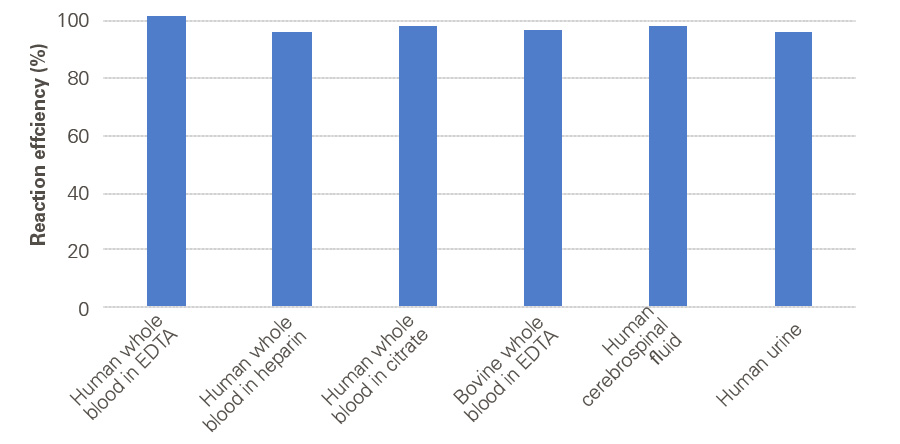Inhibitor-Tolerant qPCR/RT-qPCR Master Mixes
A variety of PCR inhibitors inherent to clinical and environmental samples can negatively impact the sensitivity and accuracy of a molecular assay. Conventionally, to overcome this, specimens undergo processing before testing. However, extraction technologies are not 100% efficient and can impact the amount of target nucleic acid available for testing. Some PCR inhibitors can also co-elute following purification, reducing the efficiency, particularly in quantitative PCR multiplex assays, and may even induce false-negative assay results.
Inhibitor-Tolerant qPCR Mix Reaction Efficiencies

Reaction efficiencies were determined from reactions containing a variety of known PCR inhibitors ranging from whole blood to biofluids (20% in reaction). The results demonstrate that the reaction efficiency of the Inhibitor-Tolerant qPCR Buffer (used in MDX013) remained within 90-110% in the presence of a wide range of common PCR inhibitors.
Inhibitor-Tolerant qPCR Mix, MDX013
通用型耐抑制剂 qPCR 母液混合物,用于直接扩增粗裂解液或富含抑制剂的样本,如尿液、脑脊液 (CSF)、血液、痰液、唾液和粪便。
文档与资源
Inhibitor-Tolerant RT-qPCR Mix, 4x, MDX016
通用型、高浓度、耐抑制剂 RT-qPCR 母液,用于直接扩增粗裂解液或富含抑制剂的样本,如尿液、脑脊液 (CSF)、血液、痰液、唾液和粪便。
文档与资源
Inhibitor-Tolerant qPCR Mix, 5x, MDX073
结合了缓冲液化学、PCR 增强剂和稳定剂方面的最新进展,以及高质量酶、dNTPs 和 MgCl2,可在存在抑制剂的情况下使用。
文档与资源
Inhibitor-Tolerant RT-qPCR Lo-ROX Mix, 4x, MDX105
结合了缓冲液化学、PCR 增强剂和稳定剂方面的最新进展,以及高质量酶、dNTPs 和 MgCl2,可在存在抑制剂的情况下使用。
文档与资源
Description
Meridian’s universal Inhibitor-Tolerant qPCR/RT-qPCR formulations are ready-to-use quantitative PCR supermixes, containing all components except primers, probes, and templates for direct qPCR and RT-qPCR. They are designed for developing qPCR multiplex assays that require minimal sample processing and fast turn-around times (TAT). Because the mixes are highly resistant to various qPCR inhibitors, they can be used with crude lysates or inhibitor-rich samples to directly detect pathogens, including viruses and bacteria, in various biological specimens and to analyze gene expression in cells.
Inhibitor-Tolerant qPCR Mix is available as a standard 2x or 5x quantitative PCR master mix; this flexibility allows assay developers more room for sample, increasing the sensitivity for low copy number samples. All steps, from pre-treatment (if required) to qPCR, to be performed in a single tube, greatly reducing hands-on time and the risk of contamination.
Inhibitor-Tolerant RT-qPCR Mix is a 4x quantitative PCR master mix, with and without low concentrations of ROX (passive reference dye), again allowing assay developers more room for sample, increasing the sensitivity for low copy number samples. Inhibitor-Tolerant RT-qPCR Mix has been designed for highly reproducible, accurate RNA and DNA target amplification under fast thermal cycling conditions, delivering excellent results in qPCR multiplex assays, even in the presence of difficult qPCR inhibitors found in blood, urine, and stool.
Specifications
| Description | A combination of the latest advances in buffer chemistry and PCR enhancers and stabilizers, together with high quality enzymes, dNTPs and MgCl2. Designed to be used in PCR reactions for highly reproducible, accurate assay results in the presence of inhibitors, such as human and animal blood. |
| Concentration | 2x, 4x and 5 x |
| Appearance | Clear, colorless solution |
| Hot Start | Antibody mediated |
| Application | Probe-based, real-time PCR, two-step RT-qPCR, one-step RT-qPCR |
| Sample type | cDNA, crude or purified RNA and/or DNA |
| Presentation | 1 vial |
| Storage | -20 °C |
| Mix stability | See outer label |
| Consistency | ±0.5/1 Ct variance between test and reference sample |
| DNA Contamination | None detected in PCR amplification with traces overlay with the negative control on E. coli and mouse genomic DNA specific targets. |
| DNase/RNase Contamination | No detectable degradation |
产品资料
Inhibitor-Tolerant qPCR & RT-qPCR MixesInhibitor-Tolerant qPCR & RT-qPCR Mixes
相关产品
Air-Dryable™ Direct DNA qPCR Blood
FAQs: Inhibitor-Tolerant Mixes
We have tested whole human and bovine blood, saliva, sputum, urine, cerebrospinal fluid (CSF), cow milk, stool sample, and plant lysate; other types of samples can be used but we would recommend testing different concentrations to determine the concentrations that can be tolerated. We also recommend you try out our specimen-specific qPCR/RT-qPCR master mixes specially designed for each specimen type, such as blood, saliva/sputum, urine, stool, or plant.
The Inhibitor-Tolerant RT-qPCR mixes have been optimized for magnesium, dNTPs, stabilizers, and enhancers, resulting in highly reproducible, accurate RNA and DNA target amplification under fast thermal cycling conditions, delivering excellent results in qPCR multiplex assays, even in the presence of difficult PCR inhibitors. So we do not recommend adding any additional material, only the primers, probe(s), and sample.
When multiplexing, standard conditions can be used, however, if necessary, the reverse transcription reaction time can be extended up to 20 minutes and/or the temperature can be increased up to 55° C and the annealing/extension time can be extended up to 60 seconds and/or the temperature can be increased up to 65° C, but this will need to be tested during optimization.
We use our own proprietary Taq polymerase and a highly optimized buffer system to overcome inhibition.
These mixes contain glycerol and so cannot be dried down; see our specimen-specific range of inhibitor-tolerant quantitative PCR mixes for lyophilized or air-dried.
我们建议使用一定范围的粗样品浓度或提取量,以确定在什么时候开始出现不可接受的 PCR 抑制。由于血液和粪便标本等某些样本类型通常含有更多的 qPCR/RT-qPCR 反应抑制剂,因此情况会有所不同。
与我们的专业团队联系
想了解更多迈迪安免疫和分子产品信息?欢迎与我们联系